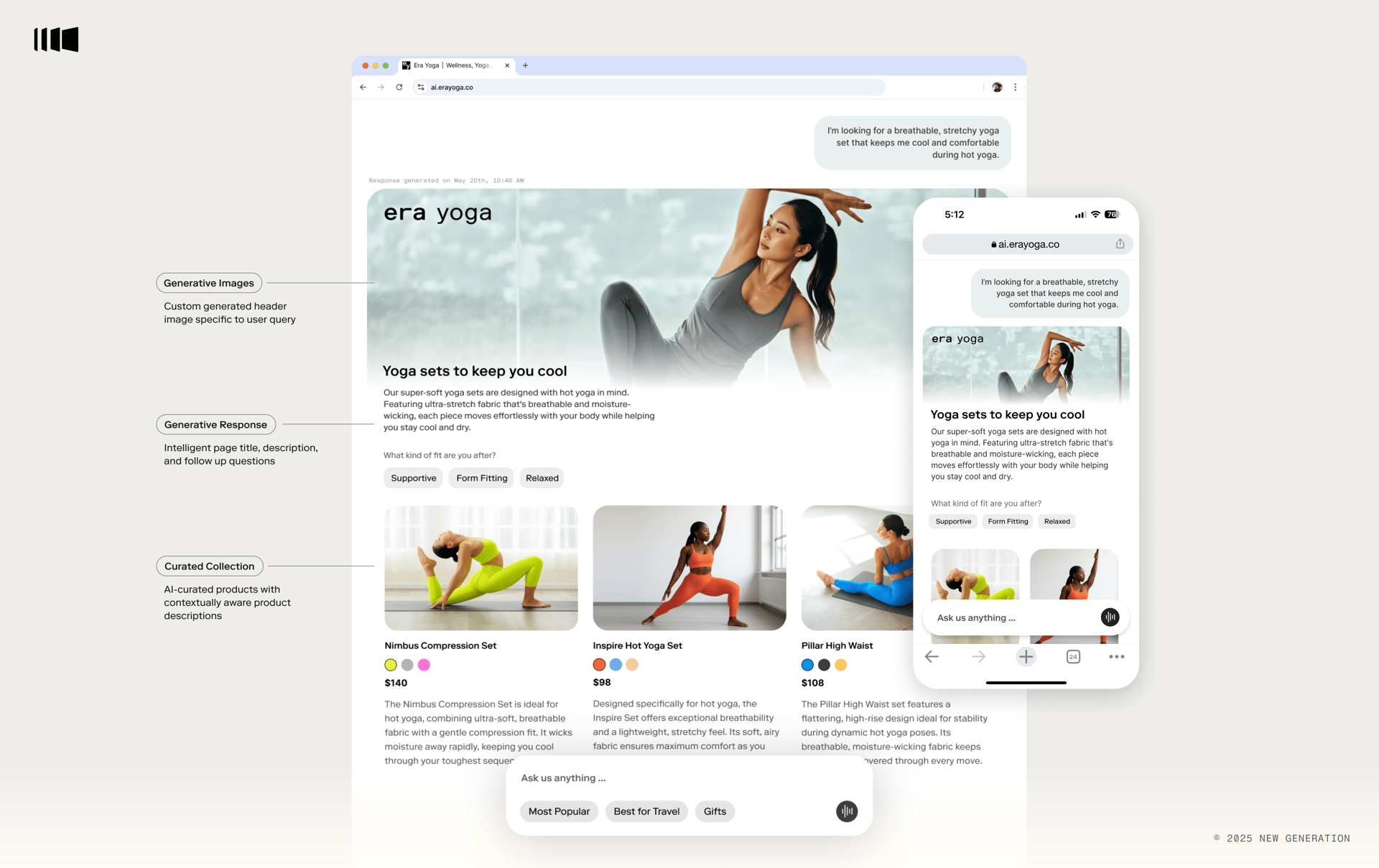Retail therapy is just getting started — thanks to AI
Fledgling companies are rewriting the rules of retail as they use AI to meet shoppers where they — and their wallets — are

Photo by Adam Gray/AFP via Getty Images)
Imagine opening your closet — except it isn’t a closet at all. It’s an app. One that knows your exact measurements, your plans, and your tendency to panic-buy crop tops every May. The app doesn’t just show you what’s trending; it tells you what still fits, what’s collecting dust in the back of your wardrobe, and what goes with that skirt you impulse-bought three years ago and never wore. Your digital closet is fully synced — color-matched, size-verified, and AI-organized.
Suggested Reading
You can swipe through outfit options on a 3D avatar of you while the app checks shipping speeds and resale prices on items curated for you by an AI that has been quietly learning your style since your first Depop binge.
Related Content
This isn’t fashion’s sci-fi fantasy. This could be retail in the 2030s, where shopping is no longer a chore but a personalized stream of suggestions, swaps, and style edits fed by AI, filtered through popular culture, and executed by machines that don’t just know your inseam — they know your vibe. Shopping will be less browsing, more briefing: “You’re going to brunch on Saturday, 74 degrees, al fresco. That lavender top you forgot you own? Pair it with the white trousers that you don’t need to rebuy.” Your entire wardrobe: searchable, shoppable, and style-checked by something smarter (and less passive-aggressive) than your best friend.
All sorts of research shows that shoppers, especially among Gen Z, are buying on their phones, where they demand personalization, advice, and sustainable, reasonably priced options. Two startups — Phia and NewGen — show where shopping is heading.
From tabs to tactics
Phoebe Gates (yes, as in that Gates family — she’s Bill’s daughter) and Sophia Kianni didn’t set out to disrupt retail. They just wanted to stop wasting hours hunting for the perfect outfit at the perfect price. Roommates at Stanford, the two bonded over a shared frustration: the endless, exhausting game of comparing prices across sites, scribbling hacks in notes tabs, and tracking sales like professional detectives. They quickly realized they weren’t alone.
“Time and time again, as we talked to other girls, we realized that pretty much every single girl who’s a power shopper has faced this exact same issue,” Gates says.
Their solution: Phia, an AI-powered browser extension that works while you browse, scanning over 40,000 websites to find better deals — on both new and secondhand items — without forcing you to change how you shop. “You don’t need to have a new app that you check every single day,” Kianni says. “We just pop up and do that little price check for you.”
Companies such as Klarna, Karma, and PayPal’s Honey are already automating the hunt for discounts and surfacing better options. But while Honey leans into coupons and cash-back and Klarna offers flexible payment options and curated drops, Phia aims to go further, positioning itself as a kind of savvy shopping assistant.
The broader trend is clear: Consumers increasingly expect their devices to do the heavy lifting.
According to a 2022 report from McKinsey, nearly 70% of consumers expect companies to personalize their interactions, and 76% get frustrated when that doesn’t happen. Browser-based tools are becoming key players in delivering that experience — not by reinventing retail, but by reshaping how discovery happens.
Phia allows users to set personal alerts — for example, “Let me know if this $500 coat drops below $300,” or, “Alert me if a secondhand version under $200 pops up.” Phia’s browser extension is part of a broader AI-powered personalization wave sweeping the retail industry: A 2025 Apply Digital report found that 95% of retailers are using or plan to use real-time product recommendations powered by AI, while 93% are exploring AI-enhanced search and 88% are testing dynamic pricing based on user behavior.
Phia’s founders see a bigger opportunity than just saving time or money. Retail, especially fashion tech, has remained largely stagnant — and that might be no accident. “Shopping and fashion hasn’t fundamentally been innovated in and disrupted in years,” Kianni says. “And I think it’s partially because this intersection of fashion and tech has just been neglected because a lot of the players in this space, quite frankly, are men.”
Gates notes that shoppers can order toilet paper from Amazon and have it arrive in under an hour, but there haven’t been many advancements when it comes to luxury e-commerce sites. That disconnect — between who shops and who builds the tools — is a gap Phia aims to close. “We are really excited to be young women who actually, genuinely love shopping and love shopping smart and love shopping secondhand, to be able to really innovate,” Kianni says.
Secondhand shopping, in particular, isn’t just a passion — it’s part of their pitch. Gates notes that buying secondhand can reduce an item’s carbon footprint by 80%, echoing data from a ThredUp report from 2021. Phia’s ability to align sustainability with cost consciousness hits a sweet spot for Gen Z.
Gates and Kianni are building the New York–based Phia with an eye toward shoppers who don’t browse the way previous generations did. “Younger consumers, especially Gen Z, they’re very mobile-first,” Gates says. “They’ll look at maybe two product pages before deciding whether or not to make a purchase.” That means there’s no room for slow-loading extensions, complicated dashboards, or greenwashed fluff. Phia surfaces the relevant details — resale options, sustainability flags, better prices — without changing how users shop.
For Gates, that means using Phia to find Yves Saint Laurent blazers for around $100, while Kianni likes to use the browser extension to get designer heels secondhand.
Phia isn’t the only tool chasing this future, but it’s part of a growing category of AI-powered services reshaping how people approach shopping. The old image of leisurely window-shopping is being replaced by recommendation engines, dynamic pricing models, and increasingly agentic AI systems — tools that don’t just respond to what users say, but anticipate what they’ll want.
For today’s busy, budget-conscious, increasingly tech-savvy shoppers, the algorithm isn’t intrusive. It’s overdue.
The backend powering the boutique

(Page mock-up via New Gen)
If Phia exemplifies the face of the new shopping interface, New Gen is the backend infrastructure with a developer’s brain and a retailer’s instinct. Where Phia aims to be your AI-powered shopping BFF, New Gen is building the storefronts that AI agents will pull from. The platform isn’t just about recommending bike shorts — it’s about making sure a company’s bike shorts show up with data and a generative, brand-controlled AI answer interface when you ask for them.
“Traditional retail websites weren’t designed for the conversational, AI-first future,” says New Gen co-founder Jonathan Arena. “We’re solving this by creating AI-native storefronts that deliver instant answers and visual, generative experiences without forcing shoppers through rigid navigation or filters.”
San Francisco–based New Gen gives each brand a dedicated, AI-optimized subdomain — think: ai.yourbrand.com — that acts as a dual gateway: Humans see a personalized, conversational experience, while AI agents get structured access to clean, enriched product data. Arena and fellow co-founder Adam Behrens are redesigning commerce for what they call the “AI internet.”
“Commerce is entering a conversational, AI-driven era where customers expect direct answers, not a scavenger hunt,” says Behrens. “Just as programmatic advertising replaced static banners, AI is fundamentally reshaping discovery and purchasing.”
Arena adds that in five years, retail brands are going to look more like software companies because of the programmatic internet. “They’re going to need to adapt this technology, understand how it works, control it, deploy it at scale, release updates,” he says.
In other words, the long-established sales funnel is dead, and in its place are apps and algorithms.
From shoppers to shapers
Gen Zers aren’t just adapting to AI — they’re the reason it’s accelerating across fashion and retail. These mobile-native shoppers don’t browse sites; they ask, scroll, and buy instantly via video, chat, and personalization tools that reflect their values. They demand speed, relevance, and sustainability at every step, and their behavior is already rewriting retail’s playbook.
The data bears this out. A 2024 report from Morning Consult found that 67% of Gen Z shoppers made an online purchase in the past year, the highest rate among all generations. This generation is also highly conscious of sustainability: NielsenIQ found that 73% of Gen Z shoppers are willing to pay a premium for sustainable products. Influencer recommendations heavily sway their buying decisions, as well: 58% have bought products endorsed by social media influencers, according to Global Web Index.
Perhaps most importantly, according to studies by Accenture and IBM, nearly 90% of Gen Z shoppers believe AI will improve their online shopping experience, and 59% expect AI to make shopping more personalized overall.
Retailers are racing to meet these expectations.
Research from Apply Digital in 2025 shows that nearly three-quarters of retailers have already embraced AI to tailor and enhance customer experiences at scale. A striking 95% are either already using or planning to deploy AI-powered real-time product recommendations soon. These shifts reveal a wholesale pivot toward dynamic, behavior-driven personalization — from product discovery through checkout — with the aim of meeting customer expectations instantly and seamlessly.
For companies like Phia and New Gen, Gen Z isn’t just the target demo — they’re the architects of what’s next. The future of shopping won’t be found in a mall or on a homepage. It’ll live in a browser extension, an AI chat, or an avatar’s closet — powered by data, optimized by programs, and styled to your scroll.
The mall is dead. Long live the algorithm.